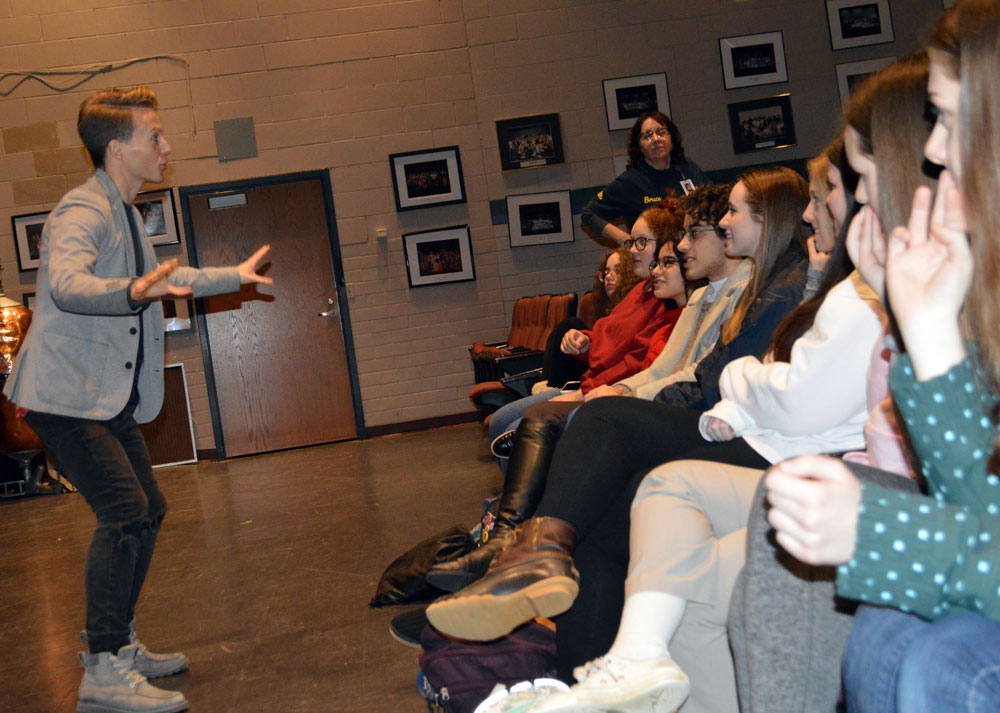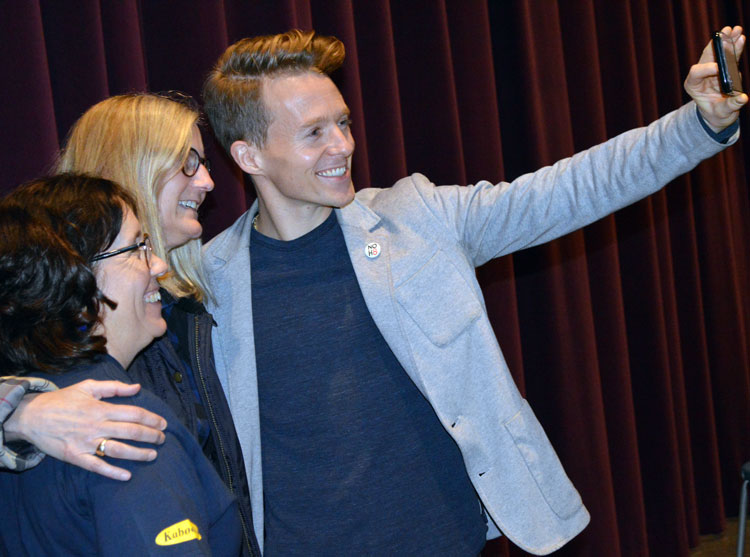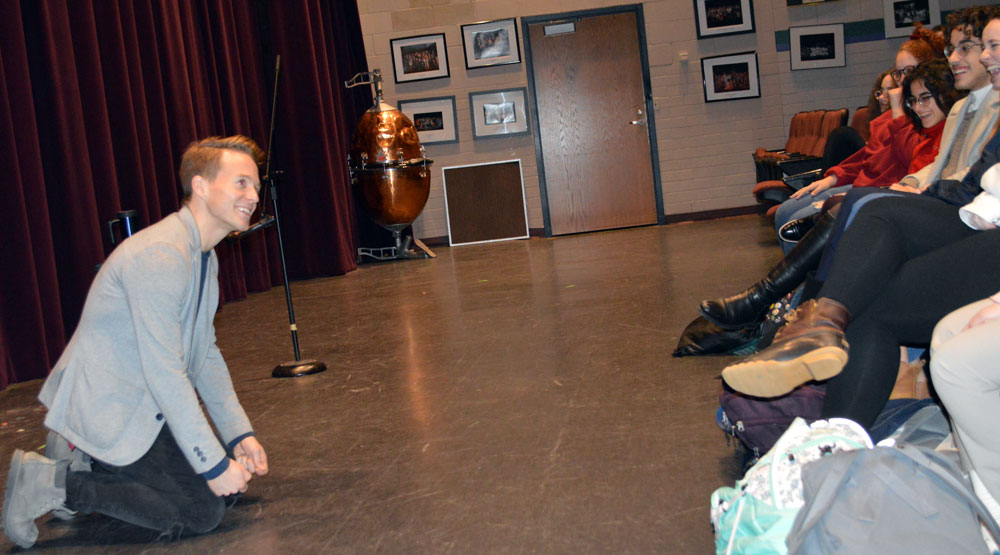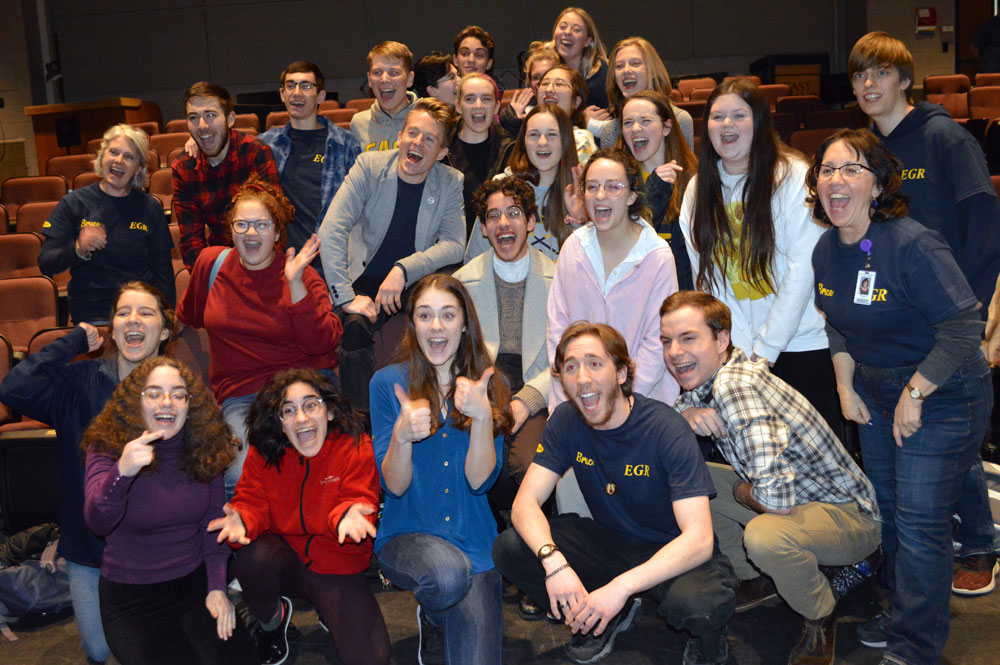Mikey Winslow wrote a “when I grow up” speech when he was a fourth grader at Lakeside Elementary, wherein he declared that his dream was to be on Broadway.
“Now I’ve been dancing on Broadway for 10 years. I know, it’s like ‘whoa.’ When I say it, it’s wild to hear those words come out of my own mouth.
“We all have such real dreams,” he recently told a group of EGR students, “and they are absolutely attainable.”

The 2004 East Grand Rapids High School grad is back home through Sunday for the Broadway Grand Rapids production of “Hamilton.” He visited his former stomping grounds on Monday and spoke with a group of very enthusiastic theater and film buffs.
For “Hamilton”, Winslow is what’s called a “swing.” He knows the choreography and role of six different men in the ensemble, so if any of them can’t play their role, he can step in.
During a packed hour before he was to lead a master class at CARE Ballet — with whom he also once danced — Winslow talked about his early performance years, which included theater classes, high school choir and marching band. Past roles include “West Side Story,” “Wicked,” a “terrible” TV version of “Dirty Dancing” and in the Chicago production of the Tony Award-winning musical as Samuel Seabury.
Some highlights of his talk with students:
On college: He earned a bachelor’s degree in musical theater performance from Western Michigan University, and repeatedly sang its praises: “Western’s (theater) program is all about individuality. So when I came out of it I was like, ‘There’s nobody like me.’ … Western is a great school and it’s continually getting better and better.”
On the question of college vs. straight to Broadway: “If you’re a dancer primarily, you need to get into a program that’s going to be able to showcase that. But you also need to decide if a showcase program is right for you, which is difficult to do at your age. … There’s also no rush. Art will always be there for you. So don’t burn out just because you don’t know how to wait. It’s about timing. Dream deliberately.
“College is not always the obvious route for getting into the performing arts. … It’s not what I thought I wanted to do when I was sitting where you are, but I’m so glad that I did. … But you are going to have experiences there that will shape you as an individual.”

He talked about the dance supervisor for “Hamilton,” who went right to LA after high school and is now working toward a college degree.
“I’ve made it 10 years, but I also know that in another 10 years I won’t be competing with the 22-year-olds, there’s just no way,” Winslow said. “The reality of the performer is that the door may eventually close. And it will be so much better to be on the right side of that door. I think college is a really good thing, because it allows so many more doors to be open to you when you need it.”
Case in point, he said: Ali Ewoldt, a Broadway star who has a psychology degree from New York University. “She didn’t study theater. But she cultivated an academic understanding of the human brain. You know what that turns an actor into? A really compelling actor because they can so much more deeply and subtly communicate those things to an audience.
“If you have other passions, rev ‘em up too. Just go.”

On standing out in auditions and avoiding being a “really talented cookie-cutter robot”: “Exercise the confidence muscle. Because it’s a muscle, and you’ve got to train it. I’ve found the difference between people being nervous and me being confident to be a fuel. It’s like, I’m not falling down the pit. … I tell people to ‘be spectacularly you,’ because in doing that you elevate all the things that make you an individual, and that’s what they are looking for.
‘I wish someone would have told me ‘Don’t fit in. Be weird. Be wiggly emotionally. Be an artist.’’
— Mikey Winslow, EGR grad and ‘Hamilton’ cast member
“Good theater isn’t about something people have seen before; it’s when fresh things happen, new things happen, real things happen. Seeing people who are authentically themselves onstage is when we get to really connect. At the end of the day if you’re not exactly what they want, there’s nothing you can do. Dig into your individuality.”
Why dancing — no matter your vocation — “is life”: For those who aspire to the profession: “Take ballet and don’t get beaten down by it not clicking. Ballet is for the 1% genetically. … Use it as a tool to hone your movement skills.” For everyone else: “Dance has been used throughout history to celebrate, to rejoice, to grieve. … The act of dancing is all to do with expressing yourself, letting something out and feeling good. And what does that add up to? Confidence. … Dance is like speaking a new language to someone and them being able to understand it when they had no idea how to speak the language in the first place.”
Star-struck moments: There have been more than one, he said. Performing in “American Idiot,” Winslow spent six weeks on stage with Billy Joe Armstrong, the lead singer of Green Day — whose music inspired and scored the production. “It was insane, because he was my idol growing up,” Winslow told students. “Literally, I tried to be him: blue hair, eyeliner, the whole deal.”
On being an artist now: “The generation I was raised in was like ‘You’re a kid, a kid, a kid, a kid, and boom, now you’re an adult.’ You are the artist now. Claim that. I wish someone would have told me ‘Don’t fit in. Be weird. Be wiggly emotionally. Be an artist.’ “
Hey Mikey, he likes it: “I love dark chocolate. Have you been to MoKAYA in Midtown? My best friend owns it.” Also, “I’m big into yoga,” and he’s trying to be vegan-ish (still eats eggs). “Those Beyond Burgers? I’m all about that now.”

Taking it all to heart:
From junior Emma Green, who dreams of being on Broadway: “It’s so amazing to have someone who came out of this school who has been so successful. … I really loved ‘be spectacularly you.’ There’s so many people who try to fake it and aren’t themselves. I think being yourself is the best way to live.”
From junior A.J. Elias, who took a master class from Winslow in Chicago: “So many people tell you it’s a one in a million chance; when someone who has actually gotten there tells you it’s attainable, it really boosts confidence. Makes it more real. Also what he said about there being time, about not burning out; that was comforting to hear.”
From junior Grace Lawrence: “When people talk about you pursuing your passion, it’s so personal. When I tell people I want a career in this and they go ‘How are you going to make money?’ I know it’s going to be hard, but it doesn’t matter. It’s a drive. It’s a passion. It was nice hearing that from Mikey. Bottom line is, I want to be in theater.”
CONNECT










